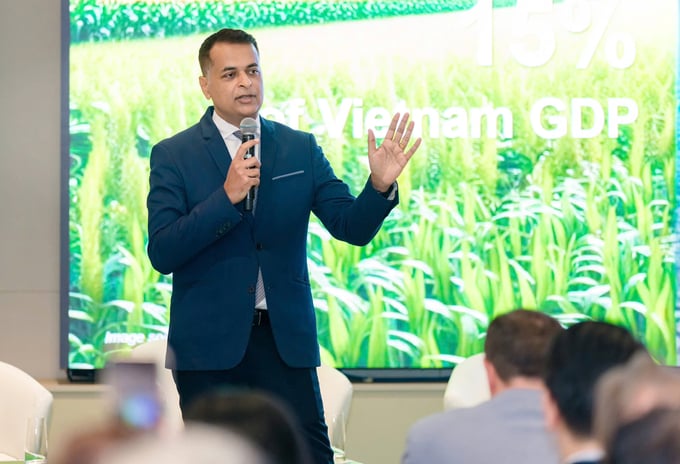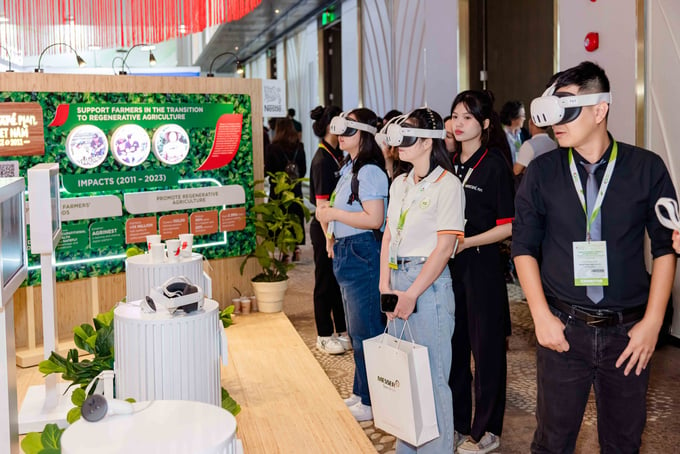May 22, 2025 | 05:24 GMT +7
May 22, 2025 | 05:24 GMT +7
Hotline: 0913.378.918
May 22, 2025 | 05:24 GMT +7
Hotline: 0913.378.918

Binu Jacob, Chairman & Managing Director of Nestlé Vietnam, giving a presentation on regenerative agriculture in coffee production.
During the "Green Economy Forum & Exhibition (GEFE) 2024," co-hosted by the Ministry of Industry and Trade and the European Chamber of Commerce (EuroCham) in Vietnam from September 21 to September 23, 2024, Nestlé Vietnam gave a presentation on the outcomes of its NESCAFÉ Plan program. This initiative has contributed to promoting regenerative food systems, improving farmers' livelihoods, reducing greenhouse gas emissions, and fostering a sustainable green future.
During the session on "Sustainable Food and Agriculture," Binu Jacob, Chairman & Managing Director of Nestlé Vietnam, stated: “The NESCAFÉ Plan is a global initiative by Nestlé aimed at delivering sustainable value to coffee farmers, communities, and the planet.
After 13 years of implementation in Vietnam, the program has achieved multiple positive outcomes by promoting multi-stakeholder cooperation and placing farmers at its center. By guiding farming households in transitioning to regenerative agriculture practices, the program improves the livelihoods of coffee-growing communities, generates positive environmental impacts, and protects biodiversity.
Additionally, Nestlé Vietnam highlighted its collective efforts to enhance the position and value of Vietnamese coffee beans. Over nearly three decades, the Nestlé Tri An plant, one of the most modern facilities within the Nestlé Group, has become a hub for producing the company's coffee products.
Nestlé Vietnam's range of products includes various brands that are familiar to Vietnamese consumers. The company has also exported to 30 countries worldwide, including high-standard, demanding markets such as the United States, Europe, South Korea, and Japan.

Visitors exploring NESCAFÉ Plan farms and the Nestlé Tri An factory through VR 360 technology.
At GEFE 2024, visitors had the opportunity to virtually "tour" NESCAFÉ Plan farms and the Nestlé Tri An factory using VR 360 technology.
With this technology, participants had the opportunity to observe the sustainable coffee farming practices as well as the process of transforming coffee beans into high-value Nestlé Vietnam products, favored by consumers both domestically and internationally.
EuroCham Vietnam's GEFE 2024 was a critical collaborative event that facilitated the exchange of ideas, connections, and collaboration among businesses, government agencies, and non-governmental organizations from Europe and Vietnam. Accordingly, the event was designed to promote greener and more sustainable growth. The topics of the event include sustainable development practices, policies, and initiatives.
Nestlé Vietnam, as Vice President of the Green Growth Sector Committee, played a leading role in steering and coordinating discussions on the circular economy. Several notable topics of discussion include the implementation of extended producer responsibility, design for recycling, and the green vision in the value chain.
Translated by Nguyen Hai Long
![Reducing emissions from rice fields: [2] Farmers’ commitment to the soil](https://t.ex-cdn.com/nongnghiepmoitruong.vn/608w/files/news/2025/05/05/dsc08881jpg-nongnghiep-140632.jpg)
(VAN) Clean rice cultivation model in Thuong Tan commune, Bac Tan Uyen district, is assisting local residents in achieving sustainable agriculture by substantially reducing costs, increasing productivity, and protecting the environment.

(VAN) At the conference to disseminate Resolution No. 68, AgriS introduced its digital agricultural ecosystem and reaffirmed its commitment to accompanying the Government in promoting private sector development and sustainable agriculture.

(VAN) 'Blue Ocean - Blue Foods' initiative is designed to restore marine ecosystems and establish sustainable livelihoods for local communities by cultivating a minimum of 1,000 hectares of cottonii seaweed in the first three years.
/2025/05/21/4642-3-112707_603.jpg)
(VAN) The V-SCOPE project has made direct contributions to three out of six pillars of the Comprehensive Strategic Partnership between Vietnam and Australia.

(VAN) Facing the threat of rabies spreading to the community, Gia Lai province urgently carries out measures to vaccinate dogs and cats on a large scale.

(VAN) Disease-free livestock farming not only protects livestock herds but also stabilizes production and livelihoods for many farmers in Tuyen Quang.

(VAN) Japan's grant aid project contributes to capacity building, promoting organic agricultural production, and fostering sustainable community development in Dong Thap province.